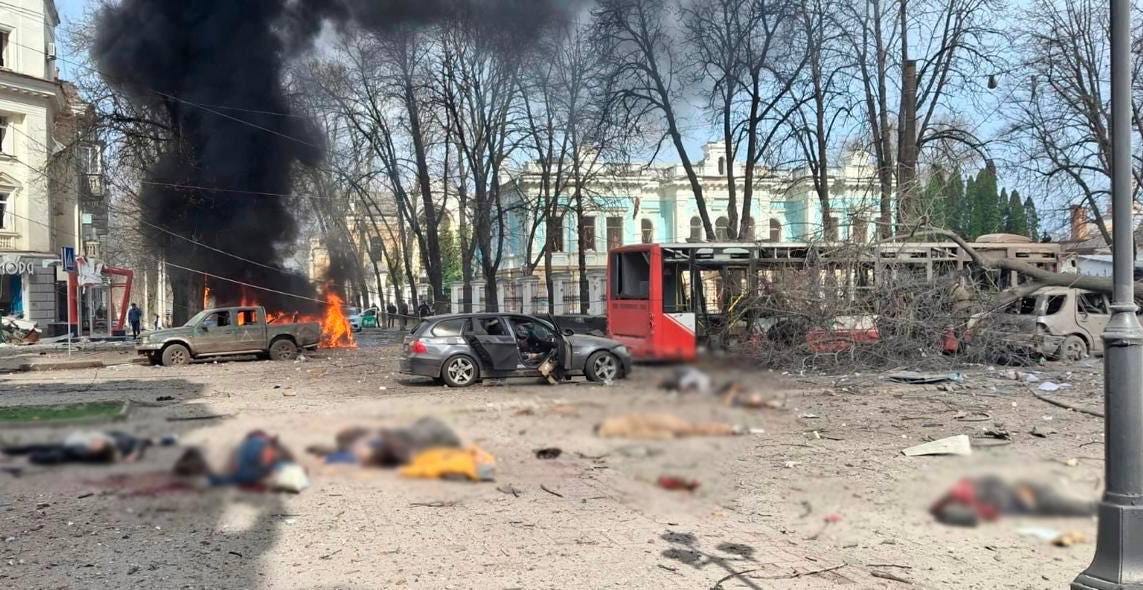Hello and welcome to your weekly briefing on Ukraine.
This week was the usual whirlwind of Washington’s peace negotiations, with an added sense of urgency — the White House’s self-imposed deadline of achieving a total ceasefire by April 20 is two days away.
Everyone paying attention knows that meeting that deadline is impossible. The obstacle is Russia. Ukraine agreed to a full, unconditional ceasefire a month ago, but the Kremlin rejected it and continued launching bloody attacks every day.
Palm Sunday massacre. Last Sunday morning, during a Christian holiday, Russia killed 35 civillians and injured more than 110 in Sumy. It was one of Russia’s deadliest attacks in years, and it made Trump’s peacemaking efforts look naive at best, yet the American President had little to say about it: “I think it was terrible,” Trump told reporters on Monday, while adding “I was told (the Russians) made a mistake.”

What bothers me most isn’t that Trump didn’t accuse Russia of committing a war crime, like the Europeans did. (Strictly speaking, large civilian casualties alone don’t prove a war crime.) What bothers me is that after three years of Russia waging a war with disregard for civilian life so indisputable that it borders on genocide, Trump is giving the Russians his benefit of the doubt.
Contrast that with Trump’s answer this week to whether the US would sell (yes, sell) weapons to Ukraine: "You don't start a war against someone 20 times your size and then hope that people give you some missiles”. That’s right, you don’t. And we didn’t.
Witkoff goes to Russia. Trump’s special envoy, Steve Witkoff, has been diving deep into Russia’s alternate reality along with his boss. Speaking to Fox News on Monday after his third round of talks with Putin, Witkoff described the contours of an “emerging” peace deal to end Russia’s war in Ukraine.
"This peace deal is about these so-called five territories," Witkoff said, apparently referring to Russian-occupied Crimea, and the partially occupied Donetsk, Luhansk, Kherson, and Zaporizhzhia oblasts. Russia officially declared the latter four regions as Russian territory in 2022, despite only having partial control of them.
Now let this sink in: the Kremlin is demanding that Ukraine voluntarily concedes more territory to Russia, and the US seems to be endorsing that.
Responding to Witkoff the next day, Zelensky said “only the people of Ukraine can speak about the territories of our state”, and that any recognition of Ukrainian land as Russian is “a red line” for Kyiv. And it’s obvious why — a recent poll shows that exactly half of Ukrainians think Ukraine shouldn’t allow for recognition of its land as Russian “under any circumstances.” Ukraine would have to rewrite its constitution to legally recognize a fifth of its territory as Russian. The move would be suicidal for the Ukrainian government. In other words, Ukraine would never agree to this.
Ceasefire that wasn’t. Speaking of things that could never work, the US-brokered 30-day energy ceasefire between Ukraine and Russia effectively ended this Thursday. It didn’t achieve anything meaningful because it was never designed to. Ukraine and Russia never settled on its terms, like the type of infrastructure it covered or even the date it began. According to Ukrainian authorities, Russia violated the ceasefire more than 30 times.
Trilateral Paris talks. French President Emmanuel Macron hosted top Ukrainian and American officials in Paris this week to discuss Ukraine’s future, a first meeting with all three sides at the table. According to Bloomberg’s sources, the US delegation presented a peace proposal to freeze the fighting and leave Russian-occupied territories under Moscow’s rule, while taking Ukraine’s NATO membership off the table. The plan, which is not final, also reportedly suggested lifting sanctions against Russia.
Moving on? Speaking to reporters today before leaving Paris, State Secretary Marco Rubio said the US might walk away from peace negotiations altogether in a matter of days.
"We are now reaching a point where we need to decide and determine whether this is even possible or not," Rubio said. "I'm talking about a matter of days, whether or not this is doable over the next few weeks. If it is, we're in. If it's not, then we have other priorities to focus on."
Trump reiterated the position hours later, saying: “If for some reason one of the two parties makes it very difficult, we’re just going to say ‘you’re foolish, you’re fools, you’re horrible people’ and we’re going to take a pass.”
But what does taking a pass look like? Will the US continue sharing intelligence with Ukraine? Will it allow Biden-allocated weapons deliveries to keep flowing? Will it go back to business as usual with Russia? Quitting wars is complicated.
Other stories I’m following…
Speedy deal, strategic gains: inside the US-Ukraine mineral agreement timeline by European Pravda. Kyiv and Washington signed a one-page memorandum this week, pledging to “work expeditiously” to finalize the controversial minerals deal that would establish a “reconstruction investment fund”. Trump said the actual deal could be signed as soon as next week.
Trump’s D.C. U.S. attorney pick appeared on Russian state media over 150 times, the Washington Post reports. This kind of news will never stop being mind-boggling. Make America Russian, I guess.
Decolonizing Russia — what it means and why it matters, from the Kyiv Independent. It’s always a good idea to read about Russian colonialism.
Let me know what you are reading!
Cheers,
Yours Ukrainian






Dear Anastasia, I am so grateful for your letters. I send you all love and support for working under what must be such diffiuclt conditions. UK is probably better off without DJT's meddling. He hasn't made things better. I hope and pray Europe can step up with weapons and aid. Take care of yourself. Stay well! From a grateful American who is ashamed of my country right now.
You deserve our admiration for continuing to fight for your independence.
Keep the faith: many Americans are with you.